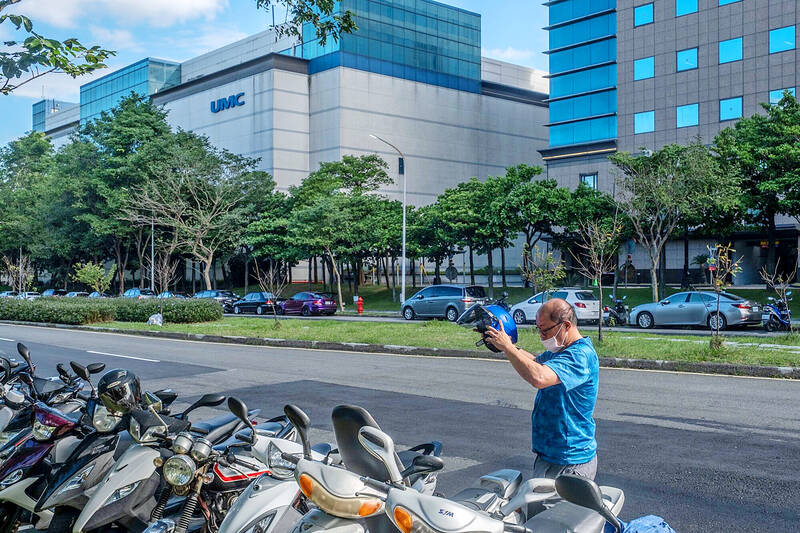Contract chipmaker United Microelectronics Corp (UMC, 聯電) yesterday reported that net profit last quarter declined 30.8 percent from a year earlier due to challenging macroeconomic conditions, a prolonged inventory correction and slow demand dragging down factory utilization.
Net profit plunged to NT$13.2 billion (US$421.7 million) last quarter, compared with NT$19.07 billion a year earlier. On a sequential basis, net profit contracted 17.4 percent from NT$15.97 billion, it said.
Earnings per share (EPS) dropped to NT$1.06 last quarter from NT$1.54 a year earlier and NT$1.29 the previous quarter.

Photo: Lam Yik Fei, Bloomberg
For the full year, net profit fell 30.2 percent to NT$61.44 billion from NT$88.02 billion in 2022, with EPS plunging to NT$4.93 from NT$7.09.
“Overall, 2023 was a year in which UMC demonstrated its resilience in the face of a challenging external environment, as an optimal product mix continued to lift blended average selling price by a mid-single-digit percentage year-on-year,” UMC copresident Jason Wang (王石) said during an investors’ conference.
Revenue last year shrank 10 percent to NT$222.53 billion, but the company expects it to pick up by 10 percent this year, in line with the foundry sector’s projected growth pace, but faster than the overall semiconductor industry’s growth of a mid-single-digit percentage, it said.
Still, its revenue projection is slower than the 20 to 25 percent growth forecast by its bigger rival, Taiwan Semiconductor Manufacturing Co (台積電).
Wang attributed the difference to a flattish addressable market.
“We are cautiously optimistic about this year,” he said. “The visibility is limited by macro uncertainty. Also, we are seeing lingering inventory issues for the automotive and industrial segments, although inventories at PC and mobile phone fronts have returned to healthy levels in the fourth quarter of 2023.”
The improvement in supply chain inventories has not translated into actual orders and revenue yet, as customers remain “cautious about restocking,” he said.
UMC expects wafer shipments this quarter to rise 2 to 3 percent sequentially, but factory utilization is likely to drop to the low-60 percent range from 66 percent last quarter, it said.
Gross margin is expected to fall to about 30 percent this quarter from 32.4 percent last quarter, the company said.
The blended average selling price is forecast to slip to 5 percent sequentially, but should hold steady for the rest of the year, it said.
Following its announcement last week that it was teaming up with Intel Corp to offer 12-nanometer chips from 2027, the company yesterday said it expects to see meaningful revenue contribution from this business that year.
The company expects to have process-design-kit ready for customers next year and to begin pilot production in 2026, Wang said.
UMC and Intel are to share the development costs for this project, he said.
The partnership with Intel comes as UMC aims to pursue cost-efficient capacity expansion and technology node advancement, Wang said.
The effort would broaden UMC’s addressable market and significantly accelerate its development roadmap, he said.
UMC has raised its projected capital expenditure to US$3.3 billion this year from US$3 billion, with a big chunk of the money going into 22-nanometer and 28-nanometer process technology capacity expansion.
It added that 28-nanometer technology was the biggest revenue contributor last quarter, accounting for 36 percent.

SELL-OFF: Investors expect tariff-driven volatility as the local boarse reopens today, while analysts say government support and solid fundamentals would steady sentiment Local investors are bracing for a sharp market downturn today as the nation’s financial markets resume trading following a two-day closure for national holidays before the weekend, with sentiment rattled by US President Donald Trump’s sweeping tariff announcement. Trump’s unveiling of new “reciprocal tariffs” on Wednesday triggered a sell-off in global markets, with the FTSE Taiwan Index Futures — a benchmark for Taiwanese equities traded in Singapore — tumbling 9.2 percent over the past two sessions. Meanwhile, the American depositary receipts (ADRs) of Taiwan Semiconductor Manufacturing Co (TSMC, 台積電), the most heavily weighted stock on the TAIEX, plunged 13.8 percent in

A wave of stop-loss selling and panic selling hit Taiwan's stock market at its opening today, with the weighted index plunging 2,086 points — a drop of more than 9.7 percent — marking the largest intraday point and percentage loss on record. The index bottomed out at 19,212.02, while futures were locked limit-down, with more than 1,000 stocks hitting their daily drop limit. Three heavyweight stocks — Taiwan Semiconductor Manufacturing Co (TSMC, 台積電), Hon Hai Precision Industry Co (Foxconn, 鴻海精密) and MediaTek (聯發科) — hit their limit-down prices as soon as the market opened, falling to NT$848 (US$25.54), NT$138.5 and NT$1,295 respectively. TSMC's

TARIFFS: The global ‘panic atmosphere remains strong,’ and foreign investors have continued to sell their holdings since the start of the year, the Ministry of Finance said The government yesterday authorized the activation of its NT$500 billion (US$15.15 billion) National Stabilization Fund (NSF) to prop up the local stock market after two days of sharp falls in reaction to US President Donald Trump’s new import tariffs. The Ministry of Finance said in a statement after the market close that the steering committee of the fund had been given the go-ahead to intervene in the market to bolster Taiwanese shares in a time of crisis. The fund has been authorized to use its assets “to carry out market stabilization tasks as appropriate to maintain the stability of Taiwan’s

In a small town in Paraguay, a showdown is brewing between traditional producers of yerba mate, a bitter herbal tea popular across South America, and miners of a shinier treasure: gold. A rush for the precious metal is pitting mate growers and indigenous groups against the expanding operations of small-scale miners who, until recently, were their neighbors, not nemeses. “They [the miners] have destroyed everything... The canals, springs, swamps,” said Vidal Britez, president of the Yerba Mate Producers’ Association of the town of Paso Yobai, about 210km east of capital Asuncion. “You can see the pollution from the dead fish.